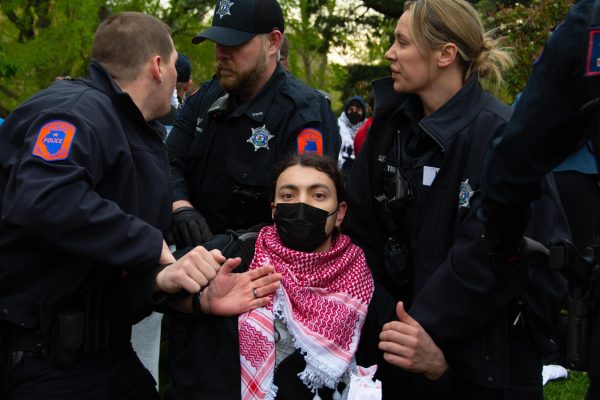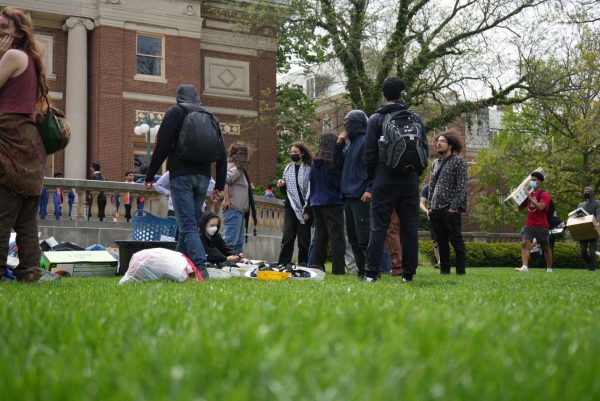Spotlight: The lost protester
August 31, 2005
“Just got home from Illinois, lock the front door, oh boy! Got to sit down, take a rest on the porch…”
Rumor has it that John Fogerty wrote those lyrics after returning home from the Incident at Kickapoo Creek, a concert in Heyworth, Ill., just 44 miles outside of Champaign, in 1970.
“The concert is the most successful rock festival you’ve never heard of,” said R.C. Raycraft, a documentarian who showed his film about the concert, entitled The Incident at Kickapoo Creek, to an audience of about 60 people at Lincoln Hall Theater on Aug. 29. Many audience members had themselves attended the concert.
“It’s really relevant to today’s college students. This is the first time since then that people (their) age are being killed in a war,” Raycraft said. “I’m really trying to raise awareness and get reactions by showing the film on campus.”
The film begins with shots of the University campus being overtaken by protestors in May of 1970. Student protests following the Kent State shootings caused widespread chaos throughout the University. Eventually the National Guard had to step in to retake control. Raycraft said he was surprised that more students at the University today were not protesting the war in Iraq.
Get The Daily Illini in your inbox!
The film took Raycraft about ten years to complete and includes dozens of interviews from festival attendees and organizers, bands who played at the festival, a preacher who went to the festival to prevent immorality among the youth and even a Pepsi distributor who sold concessions at the festival. He tracked down key players in the festival’s organization, numerous newspaper articles about the event, and hours of footage shot by police at the festival.
The concert itself took place on May 30, 1970, but people were camped out at the festival several days beforehand to see musicians like B.B. King, Ted Nugent, Canned Heat and then local college band R.E.O. Speedwagon. Rumors flew that The Who and Eric Clapton would appear and that the Beatles would reunite for the concert, although these claims proved to be false. The festival drew about 60,000 people to the town, which only had a population of 14,000.
“It was a sort of psychedelic Camelot for these people,” Raycraft said. “There were almost no police there, and the only ones that were there were undercover and had cameras.”
The festival also acquired an air of mystery when its organizer and promoter David Lewis disappeared with the proceeds from the concert.
About half of the people who attended the showing of the film had attended either the concert in Heyworth, the protests at the University, or both. Perry Hamilton and James Klingelhoffer were both members of the band Bluesweed, which was slated to play at the festival, but was delayed by rain.
“Just as we were about to play, there was a giant deluge,” Klingelhoffer said. “We all split up and went different ways, and eventually (the organizers) found us and told us we had been bumped.”
Hamilton said he and his band had enjoyed their time at the concert.
“By the time they found us, we were really in no condition to play anyway,” he said, laughing.
Peter Kimble, a resident of Champaign, had been a sound technician at the festival.
“I really enjoyed the screening, it was really nostalgic for me,” he said. “I was hoping for more shots of the bands, though, because I might be able to see myself in the background. Older people were really shocked that I had had anything to do with it at the time.”
Raycraft selected footage from several sources, but there is not much tape of the actual bands, he said. Another cut of the film includes 17 more minutes of mostly music footage, and he is considering re-editing it into the film, he said.
Much of the film shows the festivalgoers enjoying themselves by wading nude in the Kickapoo Creek, using recreational drugs or dancing with each other. Interviews in the film reveal that festivalgoers camped for several days and concessionaires made large profits as a result. There was no police control, instead, festival organizers asked the Grim Reapers motorcycle gang to attend and keep order.
Jason Pankoke, the publisher of Microfilm magazine in central Illinois, said he attended the screening to share a lead he had on some possible new footage for the film.
“I was doodling in the archives and came across a film festival at Illinois Wesleyan a few years ago that might have featured some film from the festival or the protest,” Pankoke said. “I didn’t know if the film still existed, but there’s a possibility that it would have sound with it, which is something (Raycraft) didn’t have with a lot of his footage.”
Raycraft said he was interested to get the reactions of many of the people who had attended the concert, but he was also interested in sparking conversations between today’s students and the people who had been students or attended the festival in 1970.
“Students really aren’t doing any protesting; parents are,” he said. “I think it’s a good conversation starter between the two generations.”
Raycraft is hoping to set up a forum at the University in the coming weeks to facilitate such conversations. Kimble agreed that the film presented a good topic for past protestors to talk about with the current college generation.
“I was driving my son down to college last week and we got to talking about it and it was pretty interesting,” he said.






